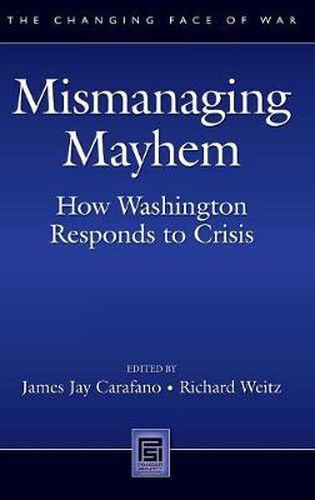Readings Newsletter
Become a Readings Member to make your shopping experience even easier.
Sign in or sign up for free!
You’re not far away from qualifying for FREE standard shipping within Australia
You’ve qualified for FREE standard shipping within Australia
The cart is loading…






One of the greatest sources of America’s troubles in Iraq, Afghanistan, and New Orleans was the inability of our government’s many parts to work well together. Often called interagency operations, applying everything that official Washington can do to keep Americans safe, free, and prosperous, is no easy task. The Pentagon, State Department, Homeland Security, Treasury, FBI, CIA, and other agencies have different capabilities, budgets, cultures, operational styles, Congressional oversight committees, and even operate under different laws. Getting them all organized on battlefields, after disasters, and during other times of crisis is often equated with herding cats. The history of getting government agencies to cooperate is replete with stories of courage, heart-breaking tragedy, and blundering incompetence. To meet the dangers of the 21st century, interagency operations will be more important than ever, yet few Americans understand the troubling history of Washington’s failures and the pressing needs for reform.
One of the greatest sources of America’s troubles in Iraq, Afghanistan, and New Orleans was the inability of our government’s many parts to work well together. Often called interagency operations, the coordination of everything official Washington can do to keep Americans safe, free, and prosperous, is no easy task. The Pentagon, State Department, Homeland Security, Treasury, FBI, CIA, and other agencies have different capabilities, budgets, cultures, operational styles, Congressional oversight committees, and even operate under different laws. Getting them all organized on battlefields, after disasters, and during other times of crisis is often equated with herding cats. The history of getting government agencies to cooperate is replete with stories of courage, heart-breaking tragedy, and blundering incompetence. To meet the dangers of the 21st century, interagency operations will be more important than ever, yet few Americans understand the troubling history of Washington’s failures and the pressing needs for reform.
This book is the first comprehensive history and sober analysis of one of the most pressing national security challenges of the century. The goal is to make a serious and unappreciated subject accessible to a wide audience through a series of engaging and informative historical case studies. The case studies span American history from the turn of the 20th century to today. They cover a variety of subjects from dealing with the great flu epidemic of 1918, to responding to natural disasters at home and abroad, to fighting wars and rebuilding countries after war. Each engaging chapter is a single case study written by a distinguished scholar who covers the historical context, the key players, actions, incidents, and, perhaps most important, lessons learned.
$9.00 standard shipping within Australia
FREE standard shipping within Australia for orders over $100.00
Express & International shipping calculated at checkout
One of the greatest sources of America’s troubles in Iraq, Afghanistan, and New Orleans was the inability of our government’s many parts to work well together. Often called interagency operations, applying everything that official Washington can do to keep Americans safe, free, and prosperous, is no easy task. The Pentagon, State Department, Homeland Security, Treasury, FBI, CIA, and other agencies have different capabilities, budgets, cultures, operational styles, Congressional oversight committees, and even operate under different laws. Getting them all organized on battlefields, after disasters, and during other times of crisis is often equated with herding cats. The history of getting government agencies to cooperate is replete with stories of courage, heart-breaking tragedy, and blundering incompetence. To meet the dangers of the 21st century, interagency operations will be more important than ever, yet few Americans understand the troubling history of Washington’s failures and the pressing needs for reform.
One of the greatest sources of America’s troubles in Iraq, Afghanistan, and New Orleans was the inability of our government’s many parts to work well together. Often called interagency operations, the coordination of everything official Washington can do to keep Americans safe, free, and prosperous, is no easy task. The Pentagon, State Department, Homeland Security, Treasury, FBI, CIA, and other agencies have different capabilities, budgets, cultures, operational styles, Congressional oversight committees, and even operate under different laws. Getting them all organized on battlefields, after disasters, and during other times of crisis is often equated with herding cats. The history of getting government agencies to cooperate is replete with stories of courage, heart-breaking tragedy, and blundering incompetence. To meet the dangers of the 21st century, interagency operations will be more important than ever, yet few Americans understand the troubling history of Washington’s failures and the pressing needs for reform.
This book is the first comprehensive history and sober analysis of one of the most pressing national security challenges of the century. The goal is to make a serious and unappreciated subject accessible to a wide audience through a series of engaging and informative historical case studies. The case studies span American history from the turn of the 20th century to today. They cover a variety of subjects from dealing with the great flu epidemic of 1918, to responding to natural disasters at home and abroad, to fighting wars and rebuilding countries after war. Each engaging chapter is a single case study written by a distinguished scholar who covers the historical context, the key players, actions, incidents, and, perhaps most important, lessons learned.